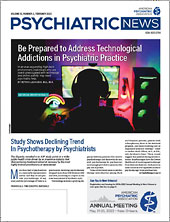It’s a treat when one of my favorite authors writes about one of my favorite topics, as with Steven Pinker’s Rationality: What It Is, Why It Seems Scarce, Why It Matters. Due to the influence of scholarly mentors, I have always found comfort in the pursuit of truth as we can best define it, utilizing rationality and the scientific method. Simply put, it has always seemed rational to be rational.
It made perfect sense to me to title my recent book from APA Publishing Rational Psychopharmacology: A Book of Clinical Skills. The publishers had some concerns about the title, fearing it might offend practitioners who felt I was calling other methods of practice irrational, and we failed to identify a better one. While the response has been positive from readers, some potential readers have indicated that by stressing rationality, they feel I might be turning my back on compassionate concern for the individual and a rich therapeutic alliance. Surprised by this reaction, I find myself pondering this false dichotomy: Why is being rational associated by some with being cold, aloof, uncaring, and dogmatic? Also, why is it offensive to describe some behaviors as irrational when they ignore or denigrate rationality?
In his book, Pinker describes how societies can progressively choose newer, truth-promoting norms that reward accurate beliefs and deemphasize inaccurate ones. This would include support for the rationality of the scientific method, upon which modern medicine must be based. Though we strive to practice only evidence-based medicine, there is often not enough evidence. Educated judgments must be made frequently, and irrational ones deprive our patients of the best care.
To my mind, accepting the responsibility of helping a patient find relief demands that I offer only my very best goodwill and intention. I can proceed only with an intact therapeutic alliance in which the patient and I look at their problems from the same side of the table, working to benefit only them. As they look to me for information and guidance, I cannot betray their trust by offering any less than my best, including the most science has to offer: A rational approach to assessing the medical literature, patient assessment, treatment selection, and monitoring. As we work together in our alliance, I assist patients in understanding this rational process, which we then use together to address their problems. To offer anything less would be unethical, as well as uncaring. How can I say my patients matter to me when I am less than careful about my assessments and recommendations? When am I not as rational as I can be?
Rationality itself is not cold, uncaring, distanced, or aloof. It is a fully engaged partnership seeking and utilizing the most valid norms of truth finding we can currently access. Seeking rationality is caring. ■

